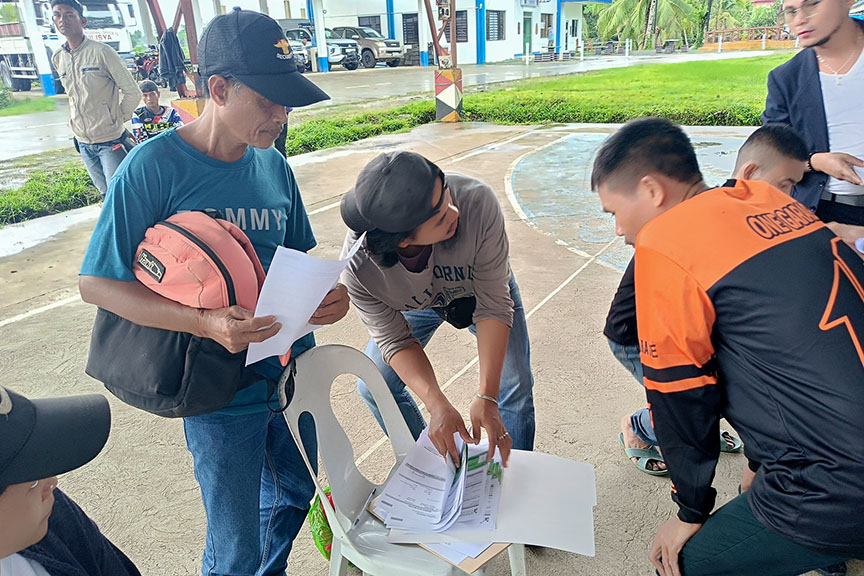SAN FRANCISCO, Agusan del Sur (MindaNews / 31 January)—The Universal Health Care (UHC) program launched by the Philippine Health Insurance Corporation (PhilHealth) here starting January 1 this year is set to benefit the 288,353 indigenous peoples (IPs) in this landlocked province.
 Manobo warriors who were once members of the Militia ng Bayan of the New People’s Army in Agusan del Sur who surrendered to the government in 2021 process their documents for membership in the PhilHealth during the Financial Assistance for the Former Rebels program held at the Provincial Police Office headquarters at Barangay Patin-ay, Prosperidad town in Agusan del Sur on Wednesday (31 January 2024). MindaNews photo by CHRIS V. PANGANIBAN
Manobo warriors who were once members of the Militia ng Bayan of the New People’s Army in Agusan del Sur who surrendered to the government in 2021 process their documents for membership in the PhilHealth during the Financial Assistance for the Former Rebels program held at the Provincial Police Office headquarters at Barangay Patin-ay, Prosperidad town in Agusan del Sur on Wednesday (31 January 2024). MindaNews photo by CHRIS V. PANGANIBAN
The UHC beneficiaries—hailing from the Manobo, Higaonon, Banwaon, and Tala-andig tribes—reside in geographically isolated, disadvantaged, and conflict-affected areas (GIDCA) across the five river towns of Agusan del Sur as outlined in a presentation by Governor Santiago Cane Jr. during the Poverty Alleviation Program October last year.
Rommel Bucayon, the officer-in-charge of the Local Health Insurance Office in this town, said in an interview Friday last week that IP beneficiaries contribute indirectly to the National Health Insurance Program, with their premiums subsidized by the national government.
Indirect contributors encompass indigent families listed under the Department of Social Welfare and Development’s (DSWD) Listahanan program, Pantawid Pamilyang Pilipino Program (4Ps) members, senior citizens, and Sangguniang Kabataan officials nationwide.
Republic Act 11223, also known as the Universal Health Care Act, enacted on February 20, 2019 by former President Rodrigo Duterte, stipulates in Section 5 that every Filipino is automatically included in the National Health Insurance Program. The Implementing Rules and Regulations, signed on October 10, 2019, further emphasized this inclusion.
Bucayon said the UHC has a significant impact on the healthcare needs of the impoverished residents, particularly given that the province remains one of the 10 poorest in the country and is the foremost in the Caraga Region, with 41 percent of its 739,367 population living below the poverty line.
PhilHealth, he added, has facilitated UHC registration for IPs, simplifying the process as long as they comprehend the benefits in the Visayan vernacular of being a PhilHealth member.
In the remote mountain village of Binicalan in San Luis town, where many residents lack birth certificates, Bucayon said that PhilHealth field workers will bring PhilHealth membership registration form for the non-member residents to fill up.
He added that even former New People’s Army rebels who surrendered to the government only need to secure police clearance to become registered PhilHealth members. The provincial government of Agusan del Sur has assisted around 101 former rebels in becoming PhilHealth members, Bucayon said.
Local government officials used to submit the list of their constituents to become PhilHealth members, but politicization prompted the government health insurance provider to task the Department of Social Welfare and Development with this responsibility.
Bucayon noted that the interior towns of La Paz and San Luis have faced challenges in enlisting residents in remote areas for the UHC program. (Chris V. Panganiban / MindaNews)
